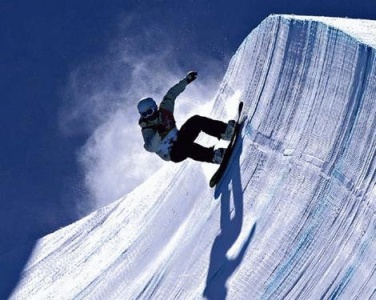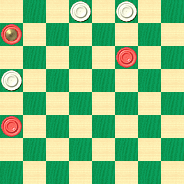The Checker Maven
Jump to navigationOn the Edge

In today's Checker School installment, we have a position that is literally "on the edge" with nearly all of the pieces starting out on the edges of the board. It's yet another instance where you think the win ought to be clear; after all, Black seems to have real superiority here---- or does he?
We certainly don't call this an easy problem. The win is fairly long and involved and concludes with an elegant tableau, and it might be a bit of a challenge for you to find the solution. Here's the position.

BLACK
White to Play, Black Wins
W:W31,30,20:BK28,22,12.
Can you edge your way to victory, or will you go over the edge instead? There's no need to worry; clicking on Read More will take the edge off your anxieties by bringing you a detailed solution with copious notes, and a sample game as well.![]()
Solution
31-27, *28-32---C, 27-23---1, 22-26, 23-18, 26-31, 18-15, 32-27, 15-10 27-23, 10-7, 31-26, 7-2, 26-22, 2-7, 23-18, 7-11, 22-17, 11-8, 18-15, 30-25, 17-14, 25-21, 14-10, 21-17, 10-7, 17-14, 7-11, 8-3, 12-16, 14-9, 16-19, 9-6, 15-10. Black Wins---2.
Game: 11-15, 22-18, 15-22, 25-18, 8-11, 29-25, 4-8, 25-22, 12-16, 24-20, 10-15, 21-17, 8-12, 17-13, 7-10, 27-24, 9-14, 18-9, 5-14, 32-27, 1-5, 24-19, 15-24, 28-19, 14-17; 27-24, 5-9, 22-18, 10-14, 19-15, 3-8, 23-19---A, 16-23, 26-19, 14-23, 15-10, 6-15, 13-6, 2-9, 19-10, 11-15, 10-7, 23-27, 7-2, 27-32, 2-6, 9-13---I, 6-10, 15-18, 24-19, 32-28, 19-15, 18-23---B, 15-11, 8-15, 10-26, 17-22, 26-17, 13-22. Forms above position. F. W. Drinkwater.
A---Losing move. Drinkwater.
B---17-21, 15-11, 8-15, 10-19, 18-22, 19-23, 28-24, 23-18, 22-25, 18-22, 25-29. Black Wins. Drinkwater vs. M'Kenzie.
C---Corrects No. 214 in Lyman's Problem Book, where Drinkwater plays 28-24, 27-23, 24-27, 23-18, 27-23, 18-15, 22-26, 30-25, 23-18, 15-11, 26-30, 25-21, 18-14, 11-7, 30-26---G, 7-3, 26-23, 3-8---H, 23-19---D, 20-16---E, 14-10, 21-17, 19-24, 16-11, 24-19, 8-3. Drawn.
D---23-18, 8-11, 14-9, 11-8, 18-15, 21-17, 9-6, 17-13, 15-10, 8-3, 6-1, 3-8, 10-15, 8-3, 15-11. Drawn. R. Raw.
E---8-11, 12-16, 11-8---F, 14-10, 20-11, 19-16. Black Wins.
F---21-17, 14-21, 11-8, 21-17, 20-11, 17-14, 11-7, 14-10, 7-3, 19-16, 8-4, 16-12.
Black Wins.
G---Now same as Game Page 12. "Familiar Themes."
H---3-7, 23-19, 7-3, 19-15, 3-8, 14-10, 21-17, 10-7, 17-14, 7-11, 8-3, 12-16, 14-9, 16-19. Black Wins. Drinkwater in Gould's Problem Book.
I---17-21, 6-13, 32-28, also wins. N. H. Clark.
1---If 27-24 then 32-27 24-19 22-26 30-23 27-18 20-16 18-23 Black Wins (Ed.).
2---A very elegant win. White now crowns with 6-1 but it's to no avail. The Black king on 11 holds the White king on 3 and the White man on 20 at bay, while the Black king on 11 prevents the new White king on 1 from ever coming to the rescue of the trapped pieces on 3 and 20. Black simply crowns his free man and the new Black king joins its compatriot on 11 in smoking out the White king in the double corner. Here's one way this could go: 6-1 19-24 1-5 24-28 5-9 28-32 9-5 32-27 5-1 27-24 1-5 24-19 5-1 19-15 1-5 10-6 5-1 15-10 1-5 6-1 5-9 1-5 9-13 10-6 13-17 6-9 etc. Ed.
The above position was first published by F. W. Drinkwater in the Fife News, April 10, 1875, as a draw, and included in Lyman's Problem Book, 1881 A weak variation was corrected by Leggett, in Leed's Mercury Supplement, Sept. 2, 1882, Problem No. 230. This correction however did not change the terms. A week later in the same column Drinkwater introduced a revised, though still faulty solution. And on Feb. 17, 1883, Janvier in No. 267 Leed's Mercury upset this new play entirely altered the terms showing a very neat Black Win. We next find the position as No. 124 in Gould's Problem Book, 1884, as a win with an altogether different solution. W. C. Belden in the Appendix to Gould's and American Checker Review, Nov. 1, 1889, as Problem No. 156, who by well timed play (see Note D and G) restored the original terms of the Problem and inscribed it to the Author, Drinkwater. Then along came Asa J. Richardson, Jan. 13, 1900, in a letter, in the North American Checker Board, Vol. 8, April 1900, and gives the position as No. 39 Prize Problem, showing that 28-32 at 2nd move would win correcting all previous play.
This win can also be found in the 3rd Edition of Gould's Problem Book, credited to W. C. Belden, in the Appendix.
You can email the Webmaster with comments on this article.
